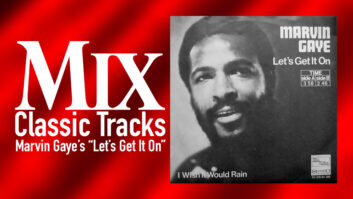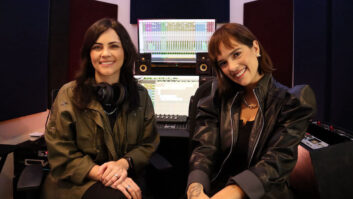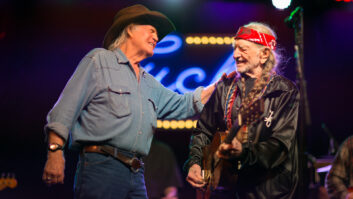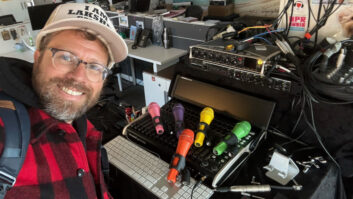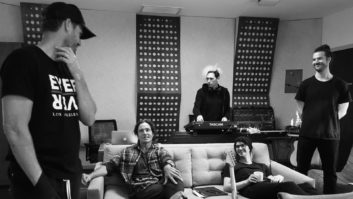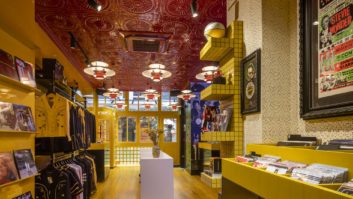
During the 2016 presidential election campaign, New Jersey-born, Nashville-based duo The Grahams—childhood sweethearts Alyssa and Doug Graham—took a five-week motorbike ride along the length of Route 66, from Chicago to the Pacific Ocean. The album they recorded after the trip, Kids Like Us, marks a new musical direction for the couple, who have evolved from acoustic-based Americana to a mix of ’60s R&B and Beatles-like rock ’n’ roll with a retro edge and a modern pop sheen.
Tracking initially took place at producer Richard Swift’s National Freedom Studio in Oregon with members of Nathaniel Rateliff’s Night Sweats. It was completed at Blackbird Studios in Nashville under the auspices of co-producer Dan Molad (this was the last project for Swift, who passed away in July 2018) with contributions from Raconteurs bassist “Little” Jack Lawrence and Lucius guitarist Peter Lalish.
For The Grahams’ first album, 2013’s Glory Bound, the pair took inspiration from riding the rails all over America. The follow-up, 2015’s Riverman’s Daughter, was inspired by the couple’s journey along the Mississippi River to the Louisiana swamps. For this third album, the Grahams’ friends, New York filmmakers Natalie Brasington and David Johnson, riding shotgun in a pickup truck, documented the jaunt and scheduled stops along Route 66 that provided plenty of material for Kids Like Us.
On the phone from their home in Nashville during lockdown, the couple—now a threesome with baby Georgette—reminisced about the long road to their latest album, which was released March 27.
On road trips and inspiration:
Doug: As the trip proceeds, we write a handful of songs. Then, when we get home, we take what we’ve absorbed and recraft them. We work with our dear friend who we grew up with, Bryan McCann, who’s been with us on all three records.
Alyssa: A lot of times on the road, we’ll also have poetry books with fragments of ideas based on conversations or landscapes or whatever. It all comes together when we get back. We also often end up writing something in the studio when we’re recording.
With Riverman’s Daughter and Glory Bound, we wrote a song that became the impetus for the journey. “Kids Like Us” was the first we wrote for this one. I just realized—they all became the title tracks. They were the songs we wrote at home, imagining the trip and what we wanted to do.
On the filmmakers’ itinerary:
Alyssa: They set up a slew of interviews from Chicago to Los Angeles. We probably did 30 interviews with artists and motel, café and curiosity shop owners along the way. We would ride three or four hours, then stop where there was an arranged interview. It made the trip much more connected to the people and places on the route. It culminated in a five-part documentary series that’s going to be out in a month or two.
Music Etc. – Huey Lewis and the News Deliver ‘Weather’ Report
Lara Downes: Reinterpreting Freedom Songs and African American Women Composers
On producer Richard Swift:
Doug: We purposely had written songs for this record that weren’t simple compositions. We knew that we were only a small part in the orchestration and that we needed somebody who could imagine something much grander than we had written.
Alyssa: A lot of the inspiration we got from Route 66 started in the Motown world. We were harkening back to some of those ’60s girl groups. Richard had this amazing way of making something very nostalgic and classic, retaining that and making it very modern. Doug and I both believe he was one of kind when it comes to how well somebody could bring those two worlds together.
On co-producer Dan Molad:
Doug: We took this trip on this nostalgic path from Chicago and ended in sunny Santa Monica. After we weren’t able to work with Richard anymore, we got Danny Molad to finish the production. He put a lot of that bright shimmer, that Los Angeles glory, on top. So we have this perfect mix of old and new, just like our journey.
Alyssa: Richard told us he had to go to rehab, or he was going to die. He did both. It was crushing.
We all love Richard Swift, and he’s a lot more well-known than Danny, but the truth is, had it been completed by Richard, it would have been a totally different record. Danny and Richard had worked together on Lucius stuff, so Danny was able to retain and respect Richard’s integrity. Danny is a modern-day genius as well; they worked so well together. And Richard was on the phone with us while we were working with Danny. The combination of the two of them made something really unique and beautiful.
On the Mellotron:
Alyssa: On the first two records, we were so conscious of keeping everything organic and acoustic. One of the reasons we sought out Richard was because we knew he would add things that we weren’t familiar with. We had recorded two basic tracks and they were sounding pretty good. Then we recorded “Painted Desert.” Richard came alive when he played the Mellotron on that song and we heard, for the first time, what the record should be. So we went back and recorded the first two songs, because of the Mellotron. It was a huge part of our wonderment and love for this record.
On Blackbird Studios:
Alyssa: Blackbird definitely has a voice on our record. One of the things I walked away with, thinking about Danny as a producer, is that he has this real sense of curiosity and experimental nature. We went into Blackbird, Studio B, and I saw all the toys—the tubular bells and the timpani! And he just wanted to try everything. I think it benefitted the sound of our record.
